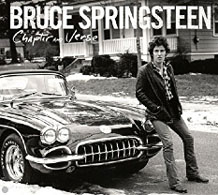![]()
| A Boogie Woogie Babe Remembers |
|
![]()
Bette Midler reissues 'The Divine Miss M', and prepares for a Broadway run.
By Kevin O'Donnell in Entertainment Weekly
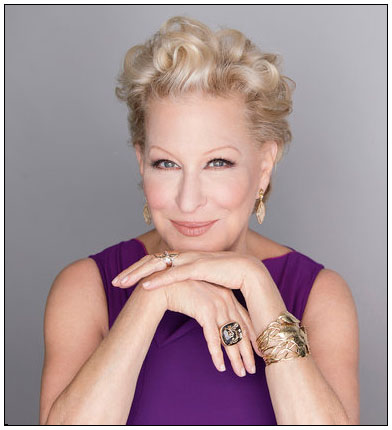
![]() he pop icon, 70, reissued her 1972 debut, The Divine Miss M, on Oct. 21. Here, she looks back on the record that launched her career, opens up about her Twitter habits, and shares why she's obsessed with Adele.
he pop icon, 70, reissued her 1972 debut, The Divine Miss M, on Oct. 21. Here, she looks back on the record that launched her career, opens up about her Twitter habits, and shares why she's obsessed with Adele.
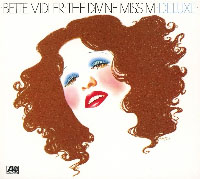 It's been more than four decades since The Divine Miss M's release. What's your most vivid memory of making the album?
It's been more than four decades since The Divine Miss M's release. What's your most vivid memory of making the album?
It was a bit stressful! I had come in with Barry Manilow and my band. And I had asked for Joel Dorn to be the producer. But Barry and Joel didn't get along. Ahmet [Ertegun, the head of Midler's label, Atlantic] decided it wasn't what they were looking forward to -- it didn't capture the craziness and energy of our live shows. So we invited a lot of people [to the studio] and we had Chinese food and then we did our show. A bunch of the album is live, and the rest is cut in the studio.
Many of these songs were part of your set at a gay bathhouse in New York City, where you were discovered. What do you remember about those days performing at the Continental Baths?
It wasn't bizarre. I could understand how other people would think it was odd. But I was in community theater growing up and I understood that world. The thing that was strangest was the dressing room. It was in the middle of the floor, in this circular room, a barbershop. You'd go up some stairs, do your makeup, then come down, go through the crowd and up onto this little stage, which was maybe the size of a rug.
Why do you think the album connected with a gay audience on such a deep level?
I think the word of mouth was serious -- people talked about it. We also played nightclubs around the country and were on the road for close to two years. We built up a following. Like Bruce Springsteen has often said, if you want to become successful, get a band and start playing in the bars. That's the truth.
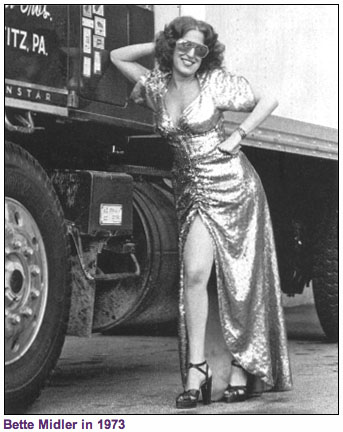 After Divine was released, you won a Grammy for Best New Artist in 1974. Were you shocked?
After Divine was released, you won a Grammy for Best New Artist in 1974. Were you shocked?
I wasn't shocked -- I was thrilled! I was also kind of mortified. Because I had tweaked Karen Carpenter at the time. [Carpenter presented the award to Midler, who had made light of the singer's eating disorder in concert.] She was so gracious and beautiful. I didn't deserve her kindness.
What singers do you admire these days?
I'm a mentor on The Voice this season, and these kids are just so talented, just extraordinary voices. And I cannot talk enough about Adele. She has a magical voice and great chops, great sensitivity, wonderful songwriting skills. And she's hilarious. The men are another story: I listen to old-school country like George Jones. I didn't know what to do when he passed away! Life does come to an end, my dear.
Any current male musicians you like?
I heard Shawn Menendez the other day. Menendez? No, those are the killers. Mendes! [Laughs] I mostly listen to the women -- I love Beyoncé and Lady Gaga. I can sing along with them. With the men, it's harder to sing in their ranges.
You'll be performing in Broadway's revival of Hello, Dolly! next year. How are rehearsals going?
I have a little trepidation because it's a steep learning curve, but I'm excited!
As someone who is vocal about your disgust for Donald Trump on Twitter, what's your mood going into the election?
I'm hopeful common sense will prevail. The last time people voted for the man they wanted to have a beer with, we wound up in a lot of trouble. [With Hillary Clinton], even if it is four more years of the same, at least we know it's a steady ship and there's not going to be too many surprises. [But] it's been so terrible -- the anguish over the race.
Are you obsessed with Twitter?
It's fun. It's easier to write short than long because you can find yourself falling asleep. I look at it as entertainment, but I don't need that much entertainment in my life. Then you feel like you're missing out on your life. I don't have that much time left, so I'm going to spend it looking around and observing and thinking and memorizing poetry.
You're throwing your annual Hulaween bash at New York's Waldorf-Astoria this month. What's in store?
We have Kathy Griffin, she'll be the hostess. And Darlene Love -- I'll probably sing with her. We're honoring Bobby Kennedy and Dan Lufkin, who helped create Earth Day. It's the last time we're doing it at the Waldorf. The booze is going to be top-shelf! ![]()

| True Bruce |
|
![]()
Bruce Springsteen chronicles his early days with a new book and LP.
by Clark Collis in Entertainment Weekly
Bruce Springsteen
Born to Run
MEMOIR
528 pages
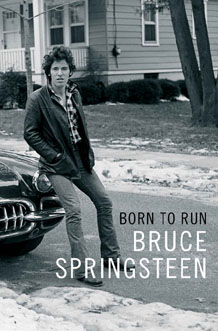
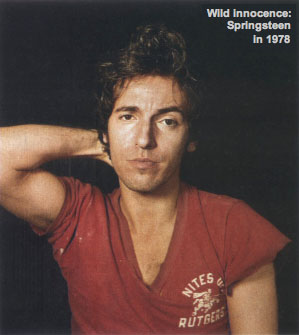
![]() ruce Springsteen has come a long way since the youthful Boss searched his New Jersey neighbors' garbage for broken radios his grandfather could fix and sell. But for a man born to run, he has stumbled plenty, as the "Born in the U.S.A." star makes clear in this autobiography. Springsteen recalls that he actually returned his first, rented guitar because playing it was "TOO F---IN' HARD!" Years later, after Springsteen's lengthy apprenticeship in local rock clubs led to a deal with CBS, poor album sales caused the label to lose faith in him and the still-nascent E Street Band. "[The label] thought we were just going to go away, return to our day jobs, go back to school, disappear into the swamps of Jersey," writes the singer. "They didn't realize they were dealing with men without homes, lives, and practicable skills or talents that would bring in a reliable paycheck in the straight world. We had nowhere to go... and we loved music!"
ruce Springsteen has come a long way since the youthful Boss searched his New Jersey neighbors' garbage for broken radios his grandfather could fix and sell. But for a man born to run, he has stumbled plenty, as the "Born in the U.S.A." star makes clear in this autobiography. Springsteen recalls that he actually returned his first, rented guitar because playing it was "TOO F---IN' HARD!" Years later, after Springsteen's lengthy apprenticeship in local rock clubs led to a deal with CBS, poor album sales caused the label to lose faith in him and the still-nascent E Street Band. "[The label] thought we were just going to go away, return to our day jobs, go back to school, disappear into the swamps of Jersey," writes the singer. "They didn't realize they were dealing with men without homes, lives, and practicable skills or talents that would bring in a reliable paycheck in the straight world. We had nowhere to go... and we loved music!"
That love bore commercial fruit with 1975's Born to Run album, and then -- after a lengthy, career-stalling legal battle with his ex-manager -- an entire orchard with 1984's Born in the U.S.A. While tales of his subsequent professional life can be less vibrant than those depicting his early struggles, Springsteen's prose comes alive whenever he writes about his relationships with loved ones, including late sax player Clarence Clemons, and his mentally troubled father, who would ultimately be diagnosed as a paranoid schizophrenic. But Springsteen is at his most revealing when he talks about his own relationship with depression, a disease he calls "the prize in the Cracker Jack box in our family," and which he attempts to keep at bay with therapy and prescription meds. The result is both an entertaining account of Springsteen's marathon race to the top and a reminder that the one thing you can't run away from is yourself. B+
A NEW WAY TO TELL THE SAGA OF SPRINGSTEEN
By Rob Sheffield in Rolling Stone
Chapter and Verse
Columbia
![]() ruce Springsteen's passion for storytelling has taken countless forms over the years -- he called his early songs "twisted autobiographies." Chapter and Verse is the companion album to his memoir, Born to Run, following the tale from his garage-band youth to his current glory days, with five tunes he's never released before. He's chosen a revelatory mix of classics and obscurities -- he leans hard on the hard-luck tales in his songbook, as the Jersey romance of "4th of July, Asbury Park (Sandy)" gives way to the dashed dreams of "The River" or "Brilliant Disguise."
ruce Springsteen's passion for storytelling has taken countless forms over the years -- he called his early songs "twisted autobiographies." Chapter and Verse is the companion album to his memoir, Born to Run, following the tale from his garage-band youth to his current glory days, with five tunes he's never released before. He's chosen a revelatory mix of classics and obscurities -- he leans hard on the hard-luck tales in his songbook, as the Jersey romance of "4th of July, Asbury Park (Sandy)" gives way to the dashed dreams of "The River" or "Brilliant Disguise."
For the previously unheard gems, he reaches all the way back to 1966, to his teen garage band the Castiles ("Baby I") and his pre-E-Street group Steel Mill, with the guitar-and-cowbell 1970 stomp "He's Guilty (The Judge Song)," drenched in Danny Federici's organ. "Henry Boy" is an acoustic rough draft for "Rosalita." But the prize is "Ballad of Jesse James," a 1972 outlaw lament à la Van Morrison or the Band, with a dash of Gregg Allman in Springsteen's drawl. He's a 22-year-old kid restless to wear a man's shoes, taking on the myths of the Old West when he's still playing bars in Jersey. He's fired up about the territory he wants to explore. And over the course of Chapter and Verse, you can hear him get there. * * * * 1/2 ![]()
![]() Reader's Comments
Reader's Comments
No comments so far, be the first to comment.

